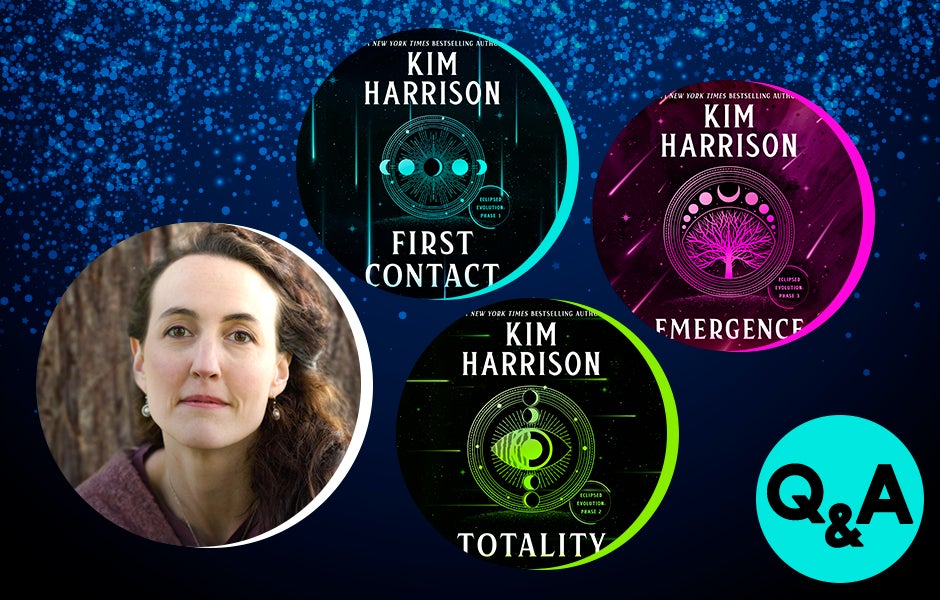
Award-winning audiobook narrator Xe Sands (pronounced “Ex-ee”) has narrated books in all genres, and describes herself as gravitating towards cerebral plotlines and complicated characters. Fortunately for listeners, Kim Harrison’s audio-first Eclipsed Evolution trilogy has an abundance of both. Plus, what self-respecting book geek can resist a sci-fi adventure that blends a tale of “first contact” with romance and a bit of magic? We sat down with Xe to talk about what it’s been like to voice this captivating series, and what she’s most excited for listeners to hear.
PRH Audio: Hi Xe! Thank you for taking the time to talk with us about the Eclipsed Evolution series (First Contact, Totality, Emergence). As the series narrator, could you tell us a little about the books?
Xe Sands: Oh it’s so hard to talk about the series without inadvertently giving something away – but I’ll try! The shell of the trilogy is a “first contact” story – but the series is so much more than that. It’s a wonderfully layered exploration of wonder and empathy, of how the stories we tell ourselves as a society – true or otherwise – shape our evolution, and how that evolution can send us down a path of renewal…or of destruction. And that Harrison used the collective human wonder globally focused at the precise moment of the 2024 eclipse was a unique and great bit of storytelling.
How did you prepare for recording these audiobooks? Did you do any special prep knowing that this was a series/audio-first production?
Xe: Because it was a series, I wanted to be sure that my characterizations would suit the arc of the various characters throughout the series – especially those who evolve in some fundamental way as the series progresses. As far as it being an audio-first production, while there wasn’t any particular prep I did specifically for that reason, it did afford me the privilege of setting the “voice” readers would hear. Ha – that must sound obvious, but I just mean that often, there is a contradicting pressure/safety combination when voicing a world readers are already familiar with…they already have the “voice” set in their heads. In this case, I had the joy and responsibility to set that “voice” from the start.
Is there a character you particularly enjoyed voicing, or part of the series you’re particularly excited for listeners to hear? (No spoilers, of course!)
Xe: I think it’s got to be Noel. Without giving anything away (SO hard!), her character arc was the most heartbreaking, and I do love heartbreaking! She was a wonderful challenge and gift to voice. As for a part that I’m particularly excited for listeners to hear – yes…but I can’t possibly talk about it without letting all the cats out of all the bags…
You’ve narrated a number of sci-fi and fantasy titles. Is there something about the genre you’re particularly drawn to?
Xe: Most of the sci-fi/fantasy titles I’ve worked on have been particularly speculative and cerebral, and I love that. I’ve been incredibly fortunate to work on phenomenal explorations of what it means to be human, what it means to be accountable for the choices we’ve made and how those choices will limit or enhance the choices of others in the future. I tend to gravitate toward the difficult stories, the “messy” characters, the tales that lack a rosy vision of the future, and Sci-Fi gives space to…run the experiment, so to speak – set the parameters of whatever calamity the author wants to explore (war, climate catastrophe, plague, space colonization, etc.).
Since we’re all listening fanatics here—what is the last great thing you listened to? (It can be an audiobook, podcast, album, or song – anything that’s made your ears happy!)
Xe: Oh I’m so glad you asked! I’m currently listening to Re: Dracula, a wonderful, full cast, epistolary adaptation of Bram Stoker’s Dracula, from Bloody Disgusting (Bloody FM). It’s releasing just about daily at this point, and tells Stoker’s iconic tale in a series of letters from the various characters. I didn’t think there was a lot left to do with Dracula, but even though it is all coming from the source text, the construction of the telling and the wonderful performances is what makes it.
